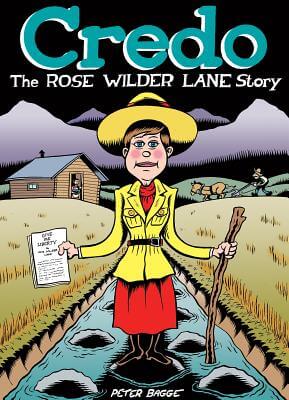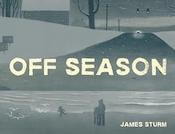Thursday Comics Hangover: Politics as character development


A couple weeks ago, I interviewed Tacoma cartoonist Peter Bagge and former Seattle cartoonist James Sturmp onstage at Elliott Bay Book Company. Bagge was in town to promote his third in a series of biographies of notable American women from the late 19th and early 20th century, Credo: The Rose Wilder Lane Story, and Sturm was here to talk about Off Season, a fictional account of a relationship falling apart against the backdrop of the 2016 election.
As a frequent moderator of multi-author discussions, I try to find a tie between the books and authors, but finding a thread between these two books is pretty tough. One is fiction, the other is non-fiction. One is heavily researched, the other began as a series of formal experiments. One is deeply funny, the other feels like a tragedy.
But eventually, I did find my tie. Both books employe politics as a kind of ambient soundtrack in the background of the stories, and politics plays a very important role in the lead characters' inner life.
In Off Season, the protagonist — an angry and alienated man — becomes more and more attracted to Trump as his chances for reconciliation dwindle. He looks back fondly on the days when he and his significant other were both Bernie supporters; now the divide between them is huge and widening. The closer he gets to Trump, the more we despair for him.
And in Credo, Lane's lifelong struggle in what was likely an undiagnosed case of manic depression or bipolar disorder includes politics when it flares up. Lane became a noteworthy libertarian who wanted the government to leave her alone, and the more political she gets in Credo, the more lucid she becomes.
The choice to employ politics as a background buzz in a comic might offend a few purity-obsessed true believers, but it really makes a special kind of sense. So much of what we say and who we are is now tied up in our politics, after all, that it's become an identifier of everything about us. Tell me how you voted in 2016 and 2018 and I'll likely be able to tell you where you shop for groceries and how you feel about religion. Why wouldn't' a writer want to include that information in story?
The risk, of course, is that Credo and Off Season run the risk of scaring off half the potential audience. It's possible that right-wingers might be offended by the portrayal of a Trump supporter, or that left-wing audiences might be turned off by Lane's libertarianism.
But honestly, I don't think so. Just as in politics, it's lunacy for cartoonists to aim broadly for an audience of "everyone." The audiences Sturm and Bagge want to reach with these books are likely the same audiences they always reach: thoughtful people who trust great artists and are eager to examine the ideas those artists want to explore. That audience is going to love the everliving fuck out of these two books.